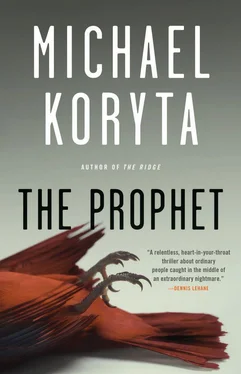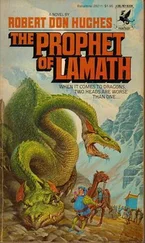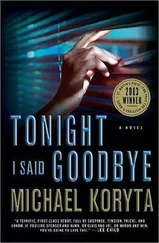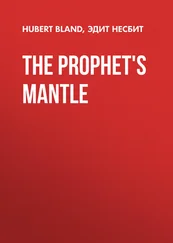Gideon Pearce’s wallet. The random traffic stop, the first clue. This was the football card that started him on his way to prison, the football card that brought Kent to him all those years later, saying he forgave him, telling him he’d like to say a prayer together, Pearce laughing—a wild, mocking laugh—as Kent got through it, head bowed and eyes shut, his voice shaking and his hands folded together so tightly the nails left half-moons of blood.
He shifted his eyes back to the business card. It was nondescript—cheap stock, gray, the name and address and two phone numbers. He used the letter opener to turn the business card over. Blank. He turned the football card over next and then, for a long time, a very long time, sat in frozen silence at his desk. When the door banged open, he rose to his feet and rushed into the locker room. Steve Haskins, playbook in one hand and cup of coffee in the other, nodded at him.
“If you’re ready, I was hoping we could go over—”
“I’m going to need you out of here for a while,” Kent said. “Kids, too. Everyone. Make sure nobody comes in here. Practice is yours.”
“Coach?”
“Practice is yours,” Kent repeated. “And keep people away from that door until the police are here.”
He went back to his office then and called Stan Salter to tell him that he knew who had killed Rachel Bond.
Part Two
LAST WEEK’S AUTUMN
23
ADAM WAS ON HIS WAY to Mansfield Correctional to interview Jason Bond when the phone began to ring. Chelsea, calling from the office, so he expected she would be calling about business. He did not care about business, and let her calls roll to voicemail three times. It wasn’t until the fourth that he finally gave in with a sigh.
“Yeah?”
“Where in the hell have you been?”
“Working. What’s up?”
“Police are searching your property, Adam.”
“Not surprised. Salter’s unhappy. Let them do their thing.”
“They aren’t here. They’re at your house.”
A tenth of a mile rolled by, two tenths, three, and Chelsea said, “Adam? You hear me?”
“They’re searching my house?”
“That’s what I’ve been told. Based on new evidence.”
“What new evidence?”
“They don’t volunteer that, Adam. They just show the warrants. We got one here, too.”
“They broke down my door?”
“No. Your brother gave them a key.”
“Gave them a key.”
“Yes. The deed’s in both of your names. He’s allowed to grant them access, legally.”
Chelsea was still talking, but his mind was empty, the world empty, consisting of nothing but gray pavement and the far-off sound of Chelsea’s voice.
“Adam? Do you want me to go there? Or call a lawyer?”
“No,” he said. “No, I’ll handle that myself.”
He hung up. He was thinking of the closed door with the handwritten sign, thinking of police entering the room, and ahead of him the highway seemed to narrow like a tunnel and pull him underwater, swift and silent.
In his entire coaching career, Kent Austin had missed one practice. That was the day his son was born, and he was back the next morning.
Today he missed his second, spent it with a sergeant from the Chambers Police Department and an FBI agent named Robert Dean. Kent wondered why the FBI was here already, recalling how long it had taken for them to get involved in Marie’s disappearance. His father had shouted for them, screamed for them, as if they were mythical problem solvers, would walk in and listen to the situation and produce his missing daughter immediately, tip their caps, and go on their way. By the time the FBI actually got involved, though, most of the heart had gone out of Hank Austin, the shouts turning to numb musings, as if he’d already checked out of his life and was studying it sadly from afar.
He kept up those musings for the rest of his life, but only Adam was allowed in. Not Kent. That was his brother’s rule, though, not his father’s. The two of them would sit in the kitchen, sharing a bottle of Scotch and an ashtray, and his father would tell tales of revenge. Never mentioning Marie’s name. They were always historical, or anecdotal, or flat-out apocryphal. He’d talk about how the Apaches would bury enemies up to their necks in the sand, coat their eyes with sweet sap from cactus, and wait for the ants to come. Talk about spies who’d had their tongues cut out, soldiers who had been left impaled on stakes in Vietnam.
There was a time when Kent felt that he should sit with them. Adam wouldn’t allow it.
“Get your ass down to the weight room,” he’d say when their father began to get warm, began to tip the bottle a little more frequently, glass clinking off glass. “Go see Coach Ward.”
Kent would go. Always with a shard of guilt, a sense that he belonged there, three men sharing their alcohol and their pain, and that he was slinking away from it like a coward. Once, and only once, his father tried to get him to stay. Poured a third glass and slid it across the table and told him to have a seat. Adam caught the glass, and told Kent to go see Coach Ward.
“Ah, he can stay,” Hank Austin had said. “It doesn’t always need to be football.”
“For him it does,” Adam said, and he looked their father in the eye and his voice was hard. There was a long pause, a frown but no argument, and then Adam spoke again, not looking at Kent. “He’s not worth a shit right now, anyhow. Dances in the pocket, throws high on the first pass after anybody gives him a good hit, and if he’s checked down to a third read in his whole damned career I’ve never seen it.”
That had been the end, the cue to leave, and Kent popped open the door and slipped out into the night and walked to the Wards’ house, where he was eating dinner more nights than not, where he listened to the family say grace before each meal, where he watched game tapes and talked to the coach and tried to pretend he was oblivious to Beth, that he didn’t live for a moment of eye contact with her.
Right up until the end, his father remained entranced by revenge stories. They weren’t always so dark, but he had an unerring ability to return to the concept. Talk about a baseball game, he’d segue over into the memory of a pitcher who’d thrown a beanball at someone who slid into a base with spikes up. Mention football, and it was a savage late hit delivered in retaliation for the way a teammate had been treated. His daily scans of the newspaper became a quest, a search for reminders of balance in a world that had ceased to offer it to him.
It always comes back around, he’d say, whether the topic be sports or war or an embezzling business partner. You always pay your dues. There was a tragic hopefulness to the assertion. He needed to believe that pain circled. If you caused it, you caught it.
Today, Kent believed that pain circled. The only problem was that all he did was catch it. He found himself thinking, as he answered questions, that he was relieved his father was dead.
“Clayton Sipes?” Robert Dean said.
“Yes. I believe that letter is from him.”
“And you know this man how?”
“I met him in prison. This summer. I was there on a speaking visit.”
“Tell us about that interaction, please.”
Something in the question caught Kent’s attention; it reeked of preparation. He appreciated a prepared man. But Dean shouldn’t be prepared for this.
“You’re already aware of this name, aren’t you?” Kent said.
“Why do you say that?”
“It doesn’t seem to have caught you by surprise.”
“We have a list of everyone who was paroled from Mansfield around the time those letters started. Everyone who might have had access to Jason Bond or awareness of the contact with his daughter. Sipes is on that list. He is not alone on it, but he’s on it.”
Читать дальше












